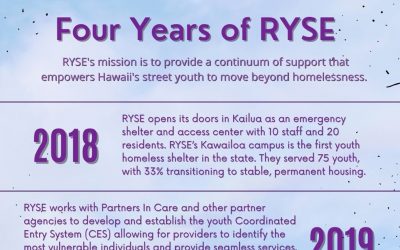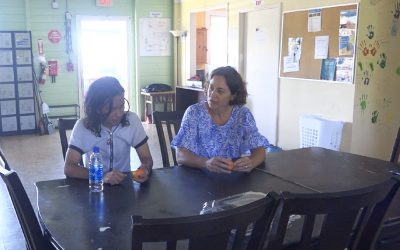Equity is an important lens in developing responsive programs that address health and social disparities. This report looks at differences in outcomes by race, gender and sexual orientation. Statistical analyses are available upon request to University of Hawaii Manoa Ecolab.
Groups of Interest
Native Hawaiians/ Pacific Islanders
Male/ Female/ Non-binary
LGBTQ+
Note: Anyone who identified as part or all Native Hawaiian or Pacific Islander were included in this group. Gender differences were assessed in three categories: those identifying as male, female, or outside the binary. LGBTQ+ includes anyone identifying as lesbian, gay, bisexual, transgender, queer, or another non-heterosexual or non-cisgender identity.
Ethnicity Differences- Summary
Over half (51%) of RYSE youth identify as Native Hawaiian compared to the state population of 27% Native Hawaiian, and three-quarters (75%) of RYSE youth identify as Native Hawaiian and/or Pacific Islander. This indicates how these groups are overrepresented at RYSE compared to overall state population. Differences in outcomes were assessed between Native Hawaiians and non-Native Hawaiians and anyone who identified as Native Hawaiian and/or Pacific Islander (NH/PI) and non-Native Hawaiian and/or Pacific Islander (non-NH/PI).
Two statistically significant findings came up for Native Hawaiian youth only:
- Of those ever arrested, Native Hawaiian youth (32%) were less likely to report spending longer than one week in jail than non-Native Hawaiian youth (58%).
- Native Hawaiians (47%) were more likely to report family issues as a reason for homelessness than non-Native Hawaiians (30%). In particular, Native Hawaiian cisgender males (61%) were more likely to report family issues as a reason for homelessness than non-Native Hawaiian cisgender males (24%).
Three outcomes of note arose when looking at Native Hawaiian and/or Pacific Islander youth:
- NH/PI youth (29%) were more likely to experience sexual violence than non-NH/PI youth (6%).
- NH/PI youth (21%) were more likely to be a parent than non-NH/PI youth (3%).
- NH/PI youth (56%) were more likely to report being homeless under the age of 18 than non-NH/PI youth (29%).
Gender Differences- Summary
The majority of statistically significant gender differences in RYSE youth pertained to crime, violence, and survival sex although some differences in health concerns were also identified.
- Transgender and nonbinary youth (88%) and cisgender females (60%) were more likely to report that they were the victim of a crime than cisgender males (29%).
- Transgender and nonbinary youth (83%) were more likely to report engaging in survival sex than cisgender females (24%) and cisgender males (10%).
- Cisgender females reported more health concerns (mean=2.2) than cisgender males (mean=1.4).
- After adjusting for reason for arrest, cisgender males were 6 times more likely than cisgender females to report spending longer than one week in jail.
- Cisgender females (72%) and transgender and nonbinary youth (86%) were more likely to report interest in a violence prevention program than cisgender males (23%).
- Cisgender females (72%) and transgender and nonbinary youth (86%) were more likely to report experiencing any domestic violence than cisgender males (23%). The pattern remains the same across physical violence (62% and 86% vs. 13% ), emotional abuse (69% and 86% vs. 22%), and sexual violence (40% and 60% vs. 3%).
LGBTQ+ Differences- Summary
Many statistically significant differences were found between LGBTQ+ youth and cisgender heterosexual youth. This indicates a need for special attention to this group to address health and social disparities.
- LGBTQ+ youth (68%) were more likely to report that they were the victim of a crime than cisgender heterosexual youth (42%).
- LGBTQ+ youth (44%) were more likely to report engaging in survival sex than cisgender heterosexual youth (14%).
- LGBTQ+ youth were more likely than cisgender heterosexual youth to report being unable to continue with school, find work, and access other programs or services due to the COVID-19 pandemic.
- LGBTQ+ youth reported on average 5 more mentally unhealthy days than cisgender heterosexual youth (18.7 vs. 13.7 days).
- LGBTQ+ youth reported more health concerns (mean=2.7) than heterosexual cisgender youth (mean=1.6).
- Of those ever arrested, LGBTQ+ youth (69%) were more likely to report spending longer than one week in jail than cisgender heterosexual youth (36%).
- LGBTQ+ youth (68%) were more likely to report interest in a violence prevention program than cisgender heterosexual youth (27%).
- LGBTQ+ youth (82%) were more likely to experience domestic violence than cisgender heterosexual youth (42%).
- LGBTQ+ youth (28%) were more likely to report domestic violence as a reason for homelessness than cisgender heterosexual youth (10%).





